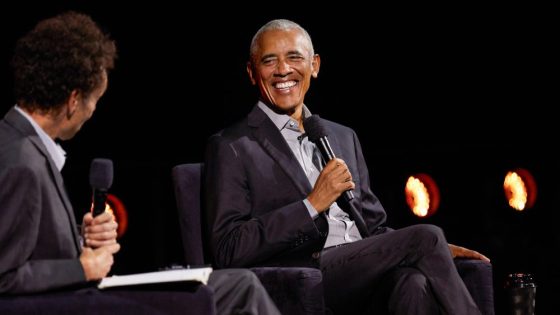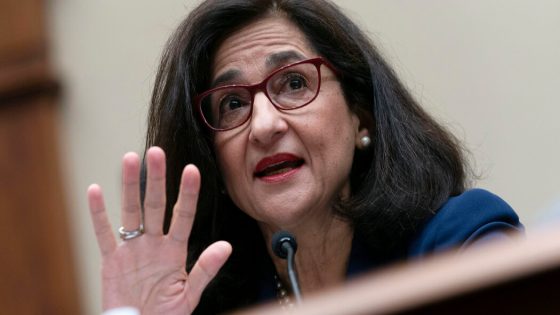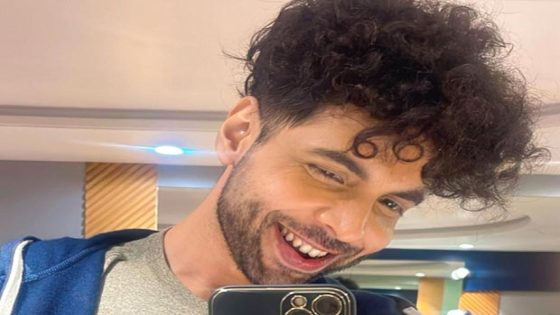Two former Presidents, one former first lady and noted historians, authors, academics and journalists gathered Saturday at the Academy Museum for a History Talks event that looked at moments of conflict in the nation’s past to bring perspective to the polarization of the present.
The 2010s were “a decade of indignation,” said David Brooks, New York Times political and cultural columnist. “That decade is now giving way – people want something more joyful.”
The event hosted by A+E Networks’ History Channel featured Q&As with President Barack Obama, who engaged playfully with Malcolm Gladwell, and President George W. Bush and first lady Laura Bush. That pair opened the half-day event with a wide-ranging conversation conducted by their daughter, “Today” co-host Jenna Bush Hager.
Other speakers at included Kevin Costner, Eva Longoria, Kerry Washington, Kate Winslet, Nicole Avant and John Legend. The event drew a large industry crowd, including Disney CEO Bob Iger, Disney Entertainment co-chair Dana Walden, Netflix co-CEO Ted Sarandos, CBS chief George Cheeks, Hearst Communications’ CEO Steve Swartz.
History Talks is an event series hosted by History Channel that is spearheaded by A+E Networks president and chairman Paul Buccieri. Past events were held in Washington, D.C. and New York. Saturday’s event also put the spotlight on L.A.’s Roybal Film and Television magnet program designed to train high school students for careers in entertainment.
NBC News’ Chuck Todd, Brooks and historians Doris Kearns Goodwin, Jon Meacham and Marcia Chatelain also contributed to the event.
During his 45-minute Q&A with Obama, Gladwell pressed the former Commander in Chief on how he has evaluated his predecessors in the White House and how his opinion of their work has changed over time. Gladwell also asked Obama what period of time he would have liked to have been president and what eight-year period he would have most liked to avoid. Obama didn’t wait a beat before pointing out the hurdles faced by Franklin D. Roosevelt and Abraham Lincoln. That led Obama to reflect on why some presidents have enormous impact.
“Folks like King, Gandhi, Lincoln — there are certain figures that I just put in a different category, because they reach down deep into our psyches, our souls and they change how we fundamentally think about ourselves and our relationships to each other. And that’s different than just the exercise of power,” Obama said. “It’s different than tactics and strategies of the other parts necessary as well the blocking and tackling of politics and coalition building. But there are certain figures who touch on something deeper. They teach us to tell a different story about ourselves and who we are.”
As Obama surveyed his time in office, he cited one of his personal highlights as an orator as his 2015 speech marking the 50th anniversary of Bloody Sunday, Dr. Martin Luther King Jr.’s march across the Edmund Pettus Bridge in support of voting rights.
“It’s probably my favorite speech because you’ve got John Lewis, kids in the backpack, maids, Pullman porters, young priests and rabbis and they’re on one side of this bridge. On the other side of this bridge, you have state power, right? And you have horses and billy clubs. There’s this contest on that bridge that is as important as Concord or Lexington or Appomattox, because it’s fundamentally a contest about who we are,” Obama said.
Among the highlights from other sessions:
Kate Winslet: Winslet spoke of the inspiration provided by the journalist at the heart of her upcoming movie “Lee,” a biopic of Elizabeth “Lee” Miller wo was active in WWII. “The courage she had not just get herself there,” Winslet said. “She stayed with her eyes wide open and she was that visual voice for the innocent victims of conflict.”
Kevin Costner: The “Yellowstone” and “Horizon” movie star spoke with historian Goodwin about his childhood experiences and how they influenced him to pursue the stories of the American west. Costner cited a pivotal visit to the Cinerama Dome as a seven-year old to see the four-hour 1962 epic Western “How the West Was Won.” “When it was over, it had marked me,” he said of the film. As he learns more about the complicated history of the period, his fascination for its impact oncontemporary culture has only grown. “As much as I love the west I’m sad almost every time I watch a real story about it,” he said. “It ends so badly for people who were here for thousands of years.”
Nicole Avant: The producer joined Kerry Washington for a panel about the upcoming Netflix film “The Six Triple Eight.” Directed by Tyler Perry, the film set to bow Dec. 20 tells an incredible, little-known story of the all-female battalion of women who sorted out the military’s intractible problem of getting mail delivered to heartsick soldiers on fighting on multiple fronts. “The idea that no one can get it done for years and then they bring in a battalion of Black and brown women who figured it out and changed the game and helped us win the war,” Avant said.
Eva Longoria: The multihyphenate closed out the program with a short Q&A with musician John Legend, who performed three songs including Bob Marley’s “Redemption Song.” Longoria cited her long history of political activism, explaining that it was ingrained in her family. Like other speakers, Longoria emphasized the importance of media and storytelling in driving political and social change. “I found out that you have to change culture before you can change policy,” Longoria said. “There’s no greater influence on the culture than the media.”
Source Agencies




